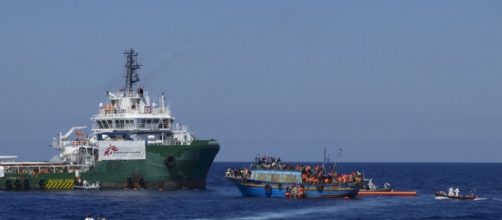According to the UN, approximately 281,740 refugees made the sea crossing to Europe within the first eight months of 2016.
An estimated to one in every 52 people died at sea during the journey, making last year the deadliest year on record for migration in the Mediterranean, and the death toll for 2017 is yet to decline as more people continue to risk the journey.
As a consequence of overpopulated life boats and illegal smuggling, hundreds of migrants are left fighting for their lives, and EU authorities - in coercion with NGOs - are frequently debating who's responsible for rescuing them.
Italy; Europe's Frontline
The Italian coastguards, who have been known to save as many as 6,500 refugees from the Mediterranean in one day, work effortlessly to rescue packed dinghies unlikely to reach the coast safely.
However, tensions have flared politically as the UN calls for an international effort to minimise the death toll of refugees at sea. While Italian politicians have argued they "need an influx of migrants and immigrants for our country to work," the coastguards have asked to support at sea to monitor the number.
The country has maintained their position as Europe's frontline for the migrant crisis for the last three years, and more than 400,000 migrants have successfully travelled to Italy from North Africa in the last two years.
Shipping steps in
Thousands of ships among a multitude of industries cross the Mediterranean every day, and a large sum of them first-hand witness the deadly journey refugees undertake.
According to the European Community Shipowners’ Association (ECSA), commercial vessels rescued 42,061 people in 2014, which is 25.2 per cent of the total number of arrivals across the Central Mediterranean. This number is likely to have almost tripled by 2018, due to the ongoing civil war in Syria and brutal conflict in Yemen.
The soar in the shipping industry rescuing migrants materialised after the cessation of Mare Nostrum - a year-long project launched by the Italian Navy to carry out a humanitarian operation aiming to save the lives of as many migrants at sea as possible.
The MTI Network, an incident response organisation supporting the shipping industry, state: "Successfully rescuing migrants is only part of the problem.
"Maintaining calm onboard, providing food water and shelter, to sometimes hundreds of people, is a huge challenge for any crew. Successfully disembarking such numbers of refugees, often at small Mediterranean ports, can also raise difficulties if public and political sentiment towards asylum seekers is low."
A moral obligation
International NGOs have continually reenforced that the refugee crisis is in a need of unified, global support and a country or certain industry is not solely responsible for the current migration cataclysm.
However, many argue that the decision of saving innocent lives at sea comes down to a moral obligation over 'professional responsibility.'
Paul Shields, an export operator who's name has been changed for anonymity reasons, believes the choice of those working in the shipping industry is a 'no-brainer:'
"When you see another human drowning in front of you, it doesn't matter who you work for or what the rules and regulations state.
We are morally obliged to save as many lives as we can, and ensure they reach safety in whichever country that may be," he said.
"I couldn't live with myself knowing that I chose to export oil over the life of a 3-month-old baby. Human instinct naturally tells you what to prioritise in that situation, and suddenly your job role is irrelevant."


